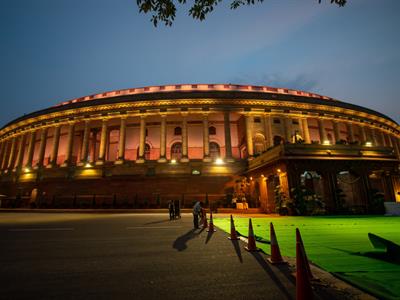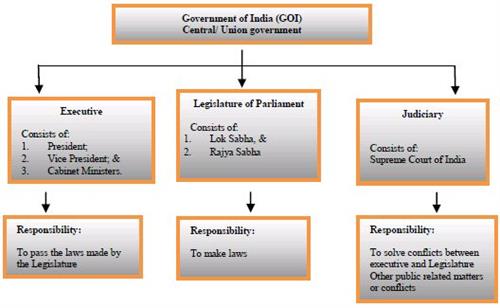
PUMPA - SMART LEARNING
எங்கள் ஆசிரியர்களுடன் 1-ஆன்-1 ஆலோசனை நேரத்தைப் பெறுங்கள். டாப்பர் ஆவதற்கு நாங்கள் பயிற்சி அளிப்போம்
Book Free DemoIn this module, lets learn about the basics of central government.
India has a separate system of administration for the Union, States and Union territories.
Students, what comes to your mind when you hear the word 'Parliament'?
Parliament is a legislative body of government i.e it basically makes laws for the country.
Students, what comes to your mind when you hear the word 'Parliament'?
Parliament is a legislative body of government i.e it basically makes laws for the country.

The power is divided between two sets of governments one at the central in Delhi and separate governments for all the states. This is called as federal system.
India is a Parliamentary democratic republic where the President of India is the Head of Indian Union and the Prime Minister and all the Ministers are responsible for smooth running of the government. This is called central government.
Parliament = Rajya sabha (Council of states) + Lok sabha (House of people)

Parliament consists of two houses namely, Rajya Sabha and Lok Sabha. their composition and functions of each houses will be discussed in higher standards. The members of Lok Sabha and Rajya Sabha are called Members of Parliament (MP).
The Term of President is 5 years.
The Term of Prime Minister is 5 years.
The Term of Lok Sabha members is 5 years.
The Term of Rajya Sabha members is 6 years.
The Term of Prime Minister is 5 years.
The Term of Lok Sabha members is 5 years.
The Term of Rajya Sabha members is 6 years.
This is a basic explanation for the Central government; you will learn in detail about the Central government in higher classes.
Current Affairs:
President of India : Ram Nath Kovind (2017 - 2022)
Prime Minister of India : Narendra Modi (2019 - Present)
Defense minister of India : Rajnath Singh (2019 - Present)
Finance minister of India : Nirmala Sitharaman (2019 - Present)
Lok Sabha speaker : Om Birla
Rajya Sabha speaker : Venkaiah Naidu ( Vice President )
President of India : Ram Nath Kovind (2017 - 2022)
Prime Minister of India : Narendra Modi (2019 - Present)
Defense minister of India : Rajnath Singh (2019 - Present)
Finance minister of India : Nirmala Sitharaman (2019 - Present)
Lok Sabha speaker : Om Birla
Rajya Sabha speaker : Venkaiah Naidu ( Vice President )
Reference:
PradeepGaurs / Shutterstock.com
https://www.mondaq.com/india/constitutional-administrative-law/654326/constitutional-framework-of-india
https://www.mondaq.com/india/constitutional-administrative-law/654326/constitutional-framework-of-india